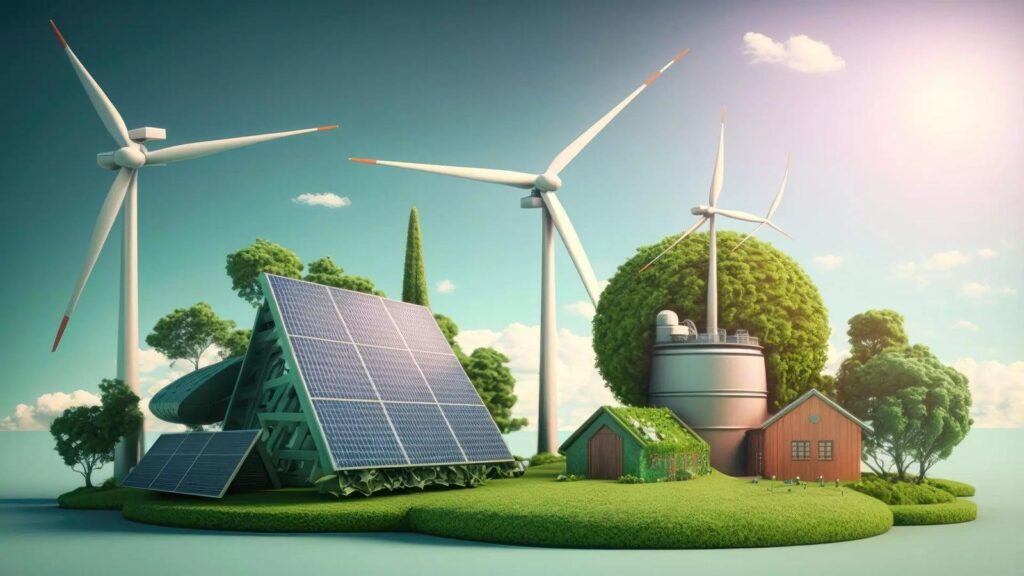Renewable energy has gained global momentum, with countries like Germany, the USA, and the UAE emerging as key players in the shift toward sustainable power. These nations have taken significant steps to embrace clean energy technologies, aiming to reduce carbon emissions and pave the way for a greener, more sustainable future. This blog explores the rise of renewable energy and the groundbreaking initiatives in these three countries, which are setting the standard for environmental responsibility and energy efficiency.

Renewable Energy-S Germany’s Revolution
For a long time, Germany has been in the front row regarding the renewable energy industry, with an ambitious commitment to reducing its carbon footprint. The Energiewende policy of the country focuses on shifting out of nuclear and coal power and working on renewable sources such as wind, solar, and biomass. More than 50% of the consumed energy that comes from renewable sources came in 2023 in Germany; thus, it sets a benchmark for the rest of the world.
Key initiatives include the large-scale wind farms in the North Sea and the Solar Energy Parks across the country. Germany has also enacted policies that enable public and private investment in green technologies, therefore securing a place for renewable energy within the nation’s energy mix.
The USA’s Drive Towards Clean Energy
Similarly, the USA, being one of the biggest consumers of energy worldwide, is increasingly developing its renewable energy resources. States, from the East Coast to the West, are championing wind, solar, and hydropower toward meeting their growing energy demands. In 2023, renewables accounted for approximately 20% of the country’s electric generation-a strong growth driven by federal and state incentives that develop clean energy.
The Biden administration has been on the front line of transitioning to clean energy, with plans to achieve a carbon-free power sector well into 2035. The proliferation of solar farms in California, Texas, and Florida, the expansion of wind power through the Midwestern states, are among evidence that the United States is trying to get off its addiction to fossil fuels.
Clean Energy Ambitions of the UAE
The UAE is on the frontline in renewable energy adoption within the Middle East. Flush with oil, this nation recognized its need to diversify into more sustainable energy systems in the long term. It is said that by mid-century, half of its energy should come from clean sources according to the UAE’s Energy Strategy 2050: nuclear, solar, and wind.
The UAE has also been able to boast of the world’s largest single-site solar project, the Noor Abu Dhabi solar plant. Further, Masdar City is poised as a hub for renewable energy research and innovation, reflecting the UAE’s commitment toward becoming a world leader in sustainability. Strategic investment by the country in clean technologies will go a long way in reducing environmental impact apart from creating newer economic opportunities.
How Germany, the USA, and the UAE Are Leading Global Change
A resurgence in renewable energy by Germany, the USA, and the UAE has shaped a more green future not just for them, but for the world. Investments by these countries in renewable technologies secure the vital role each will play in combating climate change, reducing air pollution, and fostering sustainable economic growth.
German wind and solar, large-scale renewable projects in the USA, and ambitious clean energy targets of the UAE are leading a worldwide march away from fossil fuels. These countries are also setting critical examples to the rest of the world that economic growth and sustainability go hand in hand.
Renewable Energy: Economic and Environmental Benefits
The economic benefits of renewable energy are increasingly visible in countries investing in this sector. Renewables create jobs, drive down energy costs, and reduce dependence on imported fuels. For instance, by 2022, the renewable energy sector in Germany employed more than 300,000 individuals, while in the USA, the number of clean energy workforce reached 3.4 million in 2021.
Due to the utilization of renewable energy sources, the environment ensures that there is a reduction in green gas emissions, an improvement in air quality, and the conservation of natural resources. This is highly so as nations such as Germany, the USA, and the UAE continue to adopt green technologies. In this way, the benefit to the planet will be quite substantial in the long run. Cleaner energy means less pollution, healthier ecosystems, and a better quality of life for future generations.
Overcoming Challenges in Renewable Energy Adoption
While the world is fast embracing renewable energy, there are myriads of challenges surrounding such a transition. For example, energy storage is one of the most viable concerns. Energy sources such as wind and solar power are well-known to be intermittent in nature, implying that their availability solely depends on variable weathering conditions. However, this concern is being progressively neutralized through advances in battery storage technology by allowing the storage of excess energy for later use.
The other challenge is that the initial investment involved in renewable energy is often very expensive. Financial incentives and technological innovations will have to continue from both governments and private sectors if renewable energy use is to become increasingly more feasible and affordable.
A Greener Future on the Horizon
The rise of renewable energy in Germany, the USA, and the UAE has been nothing but a manifestation of what is achievable when nations commit to sustainable power. With further investment in the technologies of clean energy, the future can only continue to look better for the planet as these leading nations strive for global sustainability. The economic, environmental, and social benefits of renewable energy can easily be spotted, with it being only a matter of time before more countries join the train of history.
